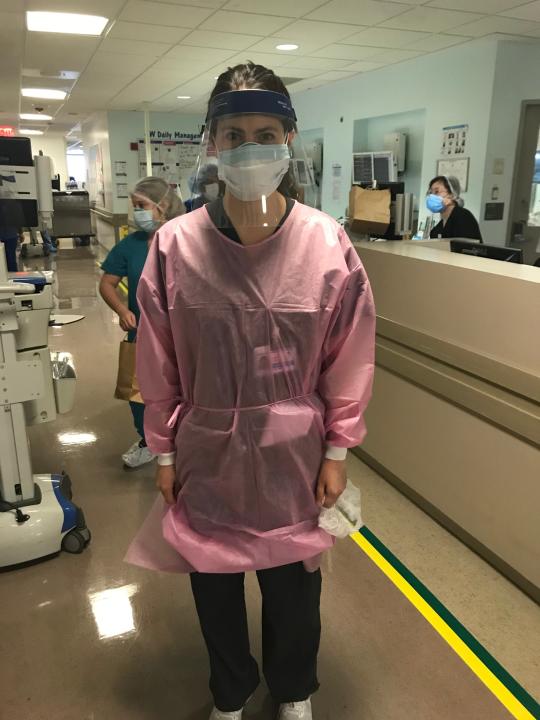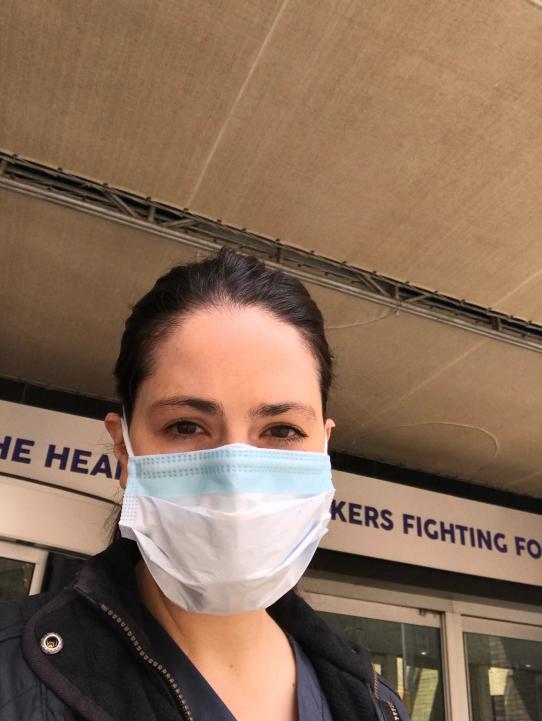The Incredible Joy of Watching a Patient Recover From COVID-19
This story is part of our Self-Care Is Essential project exploring the simple power of caring for yourself in times of crisis.
Nava Greenfield, a board-certified dermatologist with Schweiger Dermatology Group, is caring for coronavirus patients at New York City's Mount Sinai Hospital. Here, she tells Allure, in her own words, why she was inspired to volunteer, what it's like on the front lines of COVID-19, and how New York City hospitals are coping.
I'm a dermatologist and one of the regional medical directors for the Schweiger Dermatology Group. At the beginning of March, we were following the situation with the novel coronavirus closely and having conversations about what we were going to do as a practice. It was really unclear how it was going to unfold, and then it happened really, really rapidly. The middle of March is when we decided to close our offices for all nonurgent issues and switch everything to telemedicine for the protection of our patients and our staff. It was a huge transition from going into the office every day to doing everything via telemedicine.
At the same time, I had to decide how I could best utilize my training to help. Was it going to be best used in telemedicine, or did New York City need me in another way? I was also trying to balance the safety of my family. I have four kids, and school is shut down. Four kids in a Brooklyn apartment is not ideal; before the city's stay-at-home order, my husband and I decided we were going to move the family to New Hampshire.

Around that time is when I started getting emails from Andrew Cuomo, the governor of New York, saying, "If you are a physician and you feel like you can help, please volunteer." I'm also a clinical instructor at Mount Sinai, and they needed volunteers. I felt like I was in a situation where I was well-trained in medicine, and if there was an opportunity to help my city, where I come from, I was going to. I'm also an Orthodox Jew, so I felt like this was very much in line with the values of my family and how I was raised. I signed up for both, and ended up working with Mount Sinai. My husband stayed in New Hampshire with our four kids, and my sister-in-law and her boyfriend came to help with them so I could go back to New York and help [at the hospital].
"I didn't quite know what to expect, but it was completely different than what I normally do [as a dermatologist]."
The volunteer shifts are 12-hour shifts for four days in a row. I didn't quite know what to expect, but it was completely different than what I normally do [as a dermatologist]. I was an attending leading a team, taking care of only COVID-19 patients on the COVID floor. Keep in mind, Mount Sinai has transformed itself into pretty much an only-COVID hospital. All the floors that are normally filled with patients who have heart problems, scheduled procedures, or elective surgeries were not there anymore; it was only COVID-19 patients.
I saw an average of 10 patients a day, and for every single patient that we treated it was a huge team effort. Besides myself and the team I managed, there were nurses, physicians, physical therapists, social workers, and people helping the nursing staff on the floor. [At the same time,] there are no visitors allowed in the hospital, so these patients were all alone. I made sure we were in frequent contact with their families to keep them updated on what was going on.
The things that we are learning about COVID-19 change so rapidly, and we are learning about the disease as we go. From the beginning of my [shift] to the end of it, things were already changing. How we were treating it was changing. There's not all that much we can do to treat COVID-19, but we can support the body through it.

I think something people don't necessarily realize is that it is not only older people who are getting very sick; I had 40-year-olds who I was caring for that needed help breathing.
It was very intense, but the morale was actually quite high. Mount Sinai did a really nice job of providing as much support to the staff as possible. They had a relaxation room to go in — not that I had any time for that — but they had a relaxation room, and they provided meals. The head administrators came by frequently to see how we were doing and to elbow-bump us. They provided frequent updates on how many patients we were seeing, how many patients were leaving the hospital, how many patients were in the ICU.
The Personal Protective Equipment (PPE) situation has evolved. I think all hospitals are sourcing them from different places than they normally do, so there was enough PPE, but we were diligent to be very careful about when and how we used it, so as not to waste anything.
Normally when you're working in a hospital, the whole team goes in at once to see every patient. But for that to happen, my entire team would've been exposed to COVID-19 and we would've had to use PPE for the whole team. Instead, I was the only one who went inside the patient rooms to examine them, see how they were doing, talk to them, give them an update on the plan for the day. There was a big effort to conserve PPE, but I always felt safe.
"It was very intense, but the morale was actually quite high."
I did discharge two patients when I was on service, and it was really an incredible feeling. Whenever a patient was discharged, there was a song that was played across the whole unit, "Here Comes the Sun." I remember whenever that song would play, you would see the nurses dancing and clapping. Everyone was so excited. We all felt like we could partake in the joy of seeing a patient on their road to recovery. The morale was palpable, even though it was hard work.
I finished my [four-day volunteer] shift and I'm back in New Hampshire now. I took every precaution possible in the hospital to protect myself, so I'm self-quarantining with my family, but I'm not separated from my family. I'm not really able to do that.
I probably will go back to Mount Sinai in the next few weeks. I'm just waiting to hear back about when they need me [again] and for how long. If I'm able to do something that is helpful during a time of crisis, I'm happy to do it. I feel really proud to have the ability and the training to help.
This interview has been edited and condensed for clarity.
Now, check out more stories like this:
Why So Many People Are Making Big Hair Changes in Quarantine
11 Tips From Therapists on Coping With Anxiety in a Pandemic
Done reading? Watch one woman shave her head for the first time:
You can follow Allure on Instagram and Twitter, or subscribe to our newsletter to stay up to date on all things beauty.
Originally Appeared on Allure

